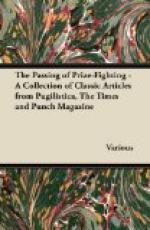“Like father like son,” says
the fable,
And is justified clearly in Abel;
No bowling he
fears
And his surname
appears
An extremely appropriate label.
If I were tremendously rich
I would buy a cathedral in which
I would build
me a shrine
Of a noble design
And worship a statue of Hitch.
* * * * *
Our Sleuths Again.
“His wrists were tied together with a piece of webbing, two bricks were in his coat pockets, and, most remarkable of all, the soles of his boots were found to be nailed to his toes.... The police theory is that somebody ’owed the dead man a grudge.’”—Provincial Paper.
* * * * *
AUTHORSHIP FOR ALL.
[Being specimens of the work of Mr. Punch’s newly-established Literary Ghost Bureau, which supplies appropriate Press contributions on any subject and over any signature.]
III.—Are we going to the Dogs?
By Vice-Admiral (Retd.) Sir Boniface Bludger, K.C.B.
I was standing the other day at the window of the only Club in London where they understand (or used to understand) what devilled kidneys really are, musing in post-prandial gloom on the vanished glories of this England of ours. “Ichabod!” I cried aloud to the unheeding stream of Piccadilly wayfarers; and echo answered, “Bod.”
What is wrong with us? Or what is wrong with me? Are we actually going to the dogs, or is it merely that the Club kidneys are going to the devil? Jeremiah or Mrs. Gummidge—which am I? Let the facts attest and let posterity decide; thank Heaven I shall not be there to hear the verdict.
After our half-baked victory over the Hun the popular watchword was “Reconstruction.” We have now enjoyed a year and more of this “building-up” process, and the net result is that houses for those that lack them are as scarce as iced soda-fountains in the Sahara.
In this work of restoration, we were told, our women voters and legislators would play a leading part. What part are they in truth playing? Their main object apparently is still further to embitter the Drink question, although if they would only put a little more bitter into our national beverage they might help to lubricate matters. Is it not a significant fact that the slackness evidenced in every phase of industry manifests itself at a time when it becomes more and more difficult to get a decent drink? In this respect our progress is not so much to the dogs as to the cats, who sneak along on the padded paws of Prohibition.
The crazy conditions to be observed in the industrial world are well matched by the state of anarchy that prevails in the sphere of the arts. Take music, for example. I do not lay claim to more than a nodding acquaintance with Euterpe, and at a classical concert, I am afraid, the nodding character of the relation becomes especially marked. To me the sweetest music in the world is the roar of a fifteen-inch gun on a day when the visibility is good and plentiful. But I do know enough to be able to say that the wild asses who with their jazz-bands “stamp o’er our heads and will not let us sleep” (slightly to amend my old friend FitzGerald) are nothing less than musical Trotskys.




